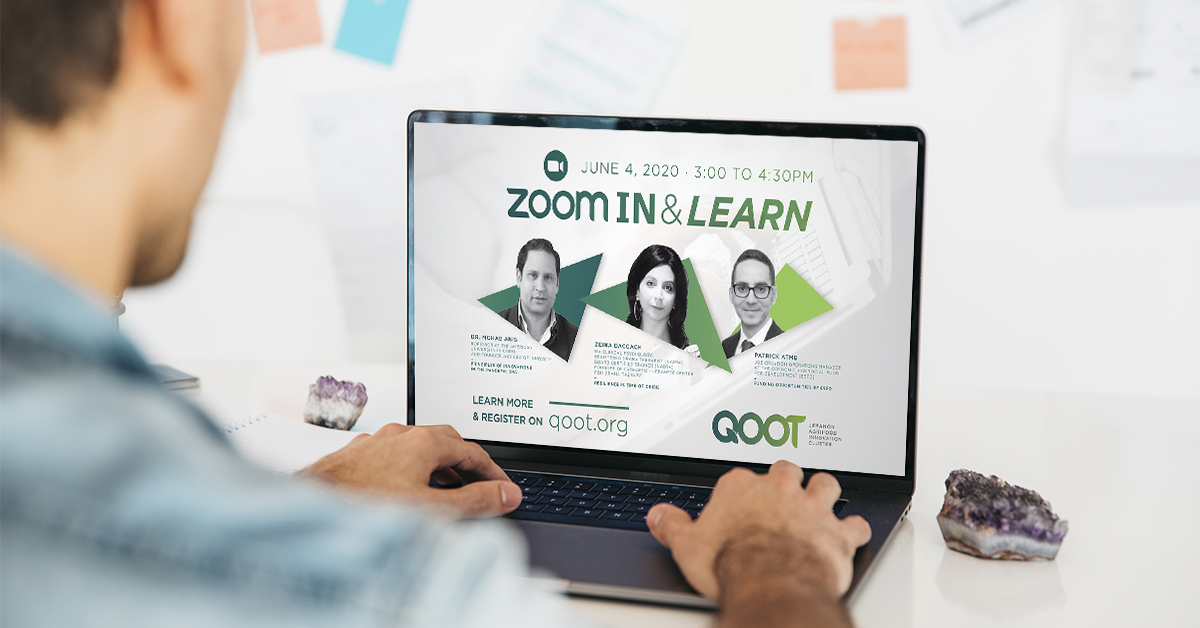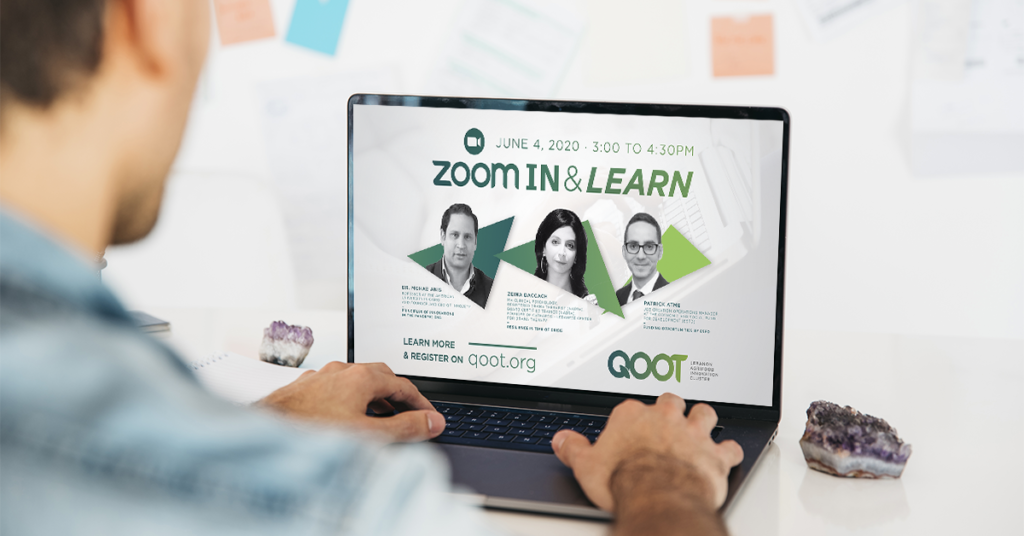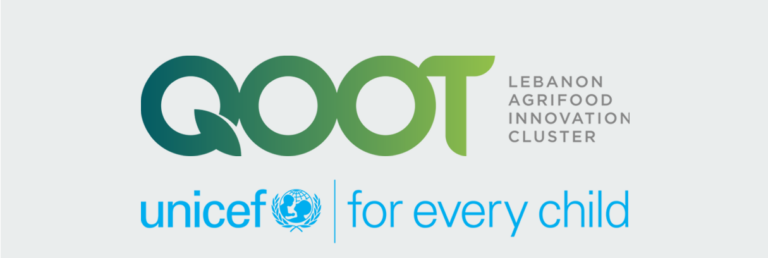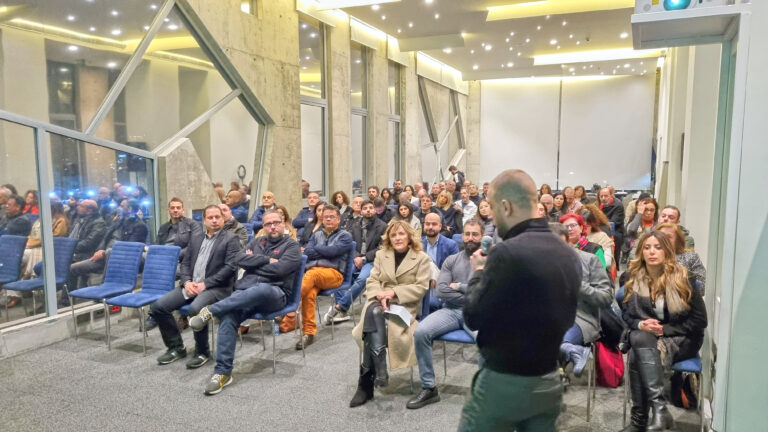
In its third Zoom In & Learn edition, QOOT Cluster brought together Lebanese enterprises and SMEs, knowledge providers and support institutions to learn about joint R&D projects, shedding light on consumer behavior in the current economic situation.
This third edition shed light about innovation and resilience in times of crisis.
Expert speaker Dr. Mohab Anis – professor at the American university of Cairo, founder and CEO of Innovety, took the audience through the principles of innovation in the pandemic era.
Patrick Atmeh – the Job Creation Operations Manager at the Economic and Social Fund for Development (ESFD), discussed funding opportunities that are provided by ESFD.
Zeina Daccache– MA in clinical psychology and registered drama therapist, took the audience through the ‘Hero’s Journey’ discussing resilience in times of crisis.
Innovating your business in the new normal
Dr. Anis explained how, during the pandemic, he was part of a global think tank to identify the directions that businesses needed to work on during and most importantly post the COVID-19 pandemic. With the social distancing measures taken to flatten the curve, a slowdown affected all types of businesses and operations. Despite closures and bankruptcies catalyzed by the pandemic, it is very important for businesses to get back into action fast.
Getting over customer fears is the first step in establishing trust. Solutions have been imposed by governments including distancing in public spaces which might not be practical, culturally sensitive nor economical. Dr. Anis offered 12 innovative design principles beyond the obvious “Six Feet Apart” solutions and walked the audience through six of them.
The first principle is based on the concept of de-centralized operations, which means transferring part of the operation elsewhere to reduce congestion. The second one is a DIY (Do It Yourself) approach that provides people with the necessary tools to take part in the development of goods, services or activities. A third principle is adding barriers between customers and servers. Another principle is time segmentation where internal operations and people are separated into time units to offer the services. Another powerful concept is the touchless experience where companies eliminate the element of touch that individuals go through when coming in contact with objects, or with each other. And finally, Dr. Anis discussed a sixth principle of resorting to digital platforms or virtual solutions to replace or complement physical offerings.
These are all models that companies need to think about when working on products or services to evolve post-pandemic. Once going back to work, each company needs to check its client’s journey within the company to identify health risk gaps and tackle them with new solutions.
Funding Opportunities
Patrick Atmeh is a UNDP Consultant, assisting the ‘Economic & Social Fund for Development’ (ESFD) in providing financial and non-financial services to SMEs since 2011. For the past 8 years, Patrick has been delivering financial advisory to small entrepreneurs, helping them applying for loans with commercial banks.
Atmeh introduced the ESFD to the audience as a governmental body who works in the poverty alleviation in Lebanon through the creation of job opportunities and improving living conditions in disadvantaged areas. The job creation component aims at creating jobs and insuring inclusion through the provision of financial and non-financial services. It provides a set of loans provided to targeted SMEs. Loans amount up to LBP 75 Million, with repayment period up to 5 years and a grace period up to 1 year and a subsidized interest rate at 7.65%. Beneficiaries include SME owners in Syrian refugee hosting communities, with projects in high job creation potential emphasizing on women entrepreneurs.
Resilience in Times of Crisis
Zeina Daccache, through the NPO she founded in 2007, Catharsis-Lebanese Center for Drama Therapy, brought the innovative tools of drama therapy to Lebanon. In her intervention, she addressed people who are experiencing anxiety from the difficult times the country is going through.
She explained the Hero’s Journey a technique she has been using to help people deal with difficult situations. The technique helps people who don’t have control over their situation requiring them to write about 4 persons in their lives. The first is a person from their childhood that they admire and associate 3 qualities to them. The second is to think of a hero from their adulthood, and also write down 3 qualities about them. The third person they need to think about is a world-famous person, and also write down 3 qualities about them. Finally, the person needs to think of his/her preferred animal and write down what they enjoy or relate to in them.
With that the person ends up with 12 qualities and the concept of the Hero’s Journey indicates that the person already possesses these qualities.
“Just because I am capable of doing this projection means that I am capable of seeing these qualities in other people but not in myself. If you don’t believe that you own these qualities, pretend that these 4 people are around you and start a conversation with them. Ask them questions and try answering them from their point of view. You will slowly realize that these qualities that you have projected are inherent to you and they will help you cope during times of crisis,” explained Daccache.
Watch the webinar here.





